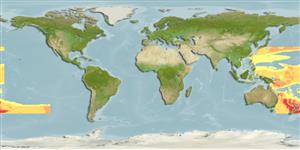Elasmobranchii (sharks and rays) >
Squaliformes (Sleeper and dogfish sharks) >
Etmopteridae (Lantern sharks)
Etymology: Etmopterus: Greek, ethmos, -ou = sieve or ethmoides bone + Greek, pteron = wing, fin (Ref. 45335).
More on author: Whitley.
Issue
Apparently restricted to eastern Australia (Ref. 87957); distribution to be resolved when new studies or publications are received.
Environment: milieu / climate zone / depth range / distribution range
Ecology
Marine; pelagic-oceanic; depth range 200 - 860 m (Ref. 26346). Deep-water; 34°N - 46°S
Western Pacific: eastern Australasia to New Zealand.
Size / Weight / Age
Maturity: Lm ? range ? - ? cm
Max length : 46.0 cm TL male/unsexed; (Ref. 6871); 39.0 cm TL (female)
Dorsal spines (total): 2; Anal spines: 0. Light brown above, black below, with a pale stripe on side and a black streak above and behind pelvic fins; belly luminous (Ref. 26346). Small and slender, with a moderately elongate caudal peduncle and with flank denticles mostly arranged in regular rows. The base of the pelvic flank markings is inserted in advance of the origin of the second dorsal-fin spine, the anterior branch is shorter than the posterior branch, and the caudal marking is longer than the precaudal marking (Ref. 6871).
Probably demersal (Ref. 31367) on upper continental slopes (Ref. 6871). Ovoviviparous (Ref. 205), size at birth about 15 cm (Ref. 6871).
Life cycle and mating behavior
Maturities | Reproduction | Spawnings | Egg(s) | Fecundities | Larvae
Ovoviviparous (Ref. 26346). Size at birth about 15 cm (Ref. 6871). Distinct pairing with embrace (Ref. 205).
Last, P.R. and J.D. Stevens, 1994. Sharks and rays of Australia. CSIRO, Australia. 513 p. (Ref. 6871)
IUCN Red List Status (Ref. 130435)
Threat to humans
Harmless
Human uses
Fisheries: of no interest
Tools
Special reports
Download XML
Internet sources
Estimates based on models
Preferred temperature (Ref.
123201): 7.8 - 14.1, mean 9.8 °C (based on 208 cells).
Phylogenetic diversity index (Ref.
82804): PD
50 = 0.5000 [Uniqueness, from 0.5 = low to 2.0 = high].
Bayesian length-weight: a=0.00380 (0.00191 - 0.00758), b=3.09 (2.92 - 3.26), in cm total length, based on LWR estimates for this Genus-body shape (Ref.
93245).
Trophic level (Ref.
69278): 4.2 ±0.5 se; based on size and trophs of closest relatives
Resilience (Ref.
120179): Very Low, minimum population doubling time more than 14 years (Assuming Fec<10).
Fishing Vulnerability (Ref.
59153): Moderate vulnerability (36 of 100).
